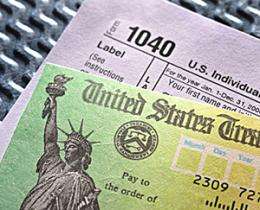Stimulus package 'Making Work Pay' credit may lead to bigger tax bills this year

The small increase in take-home pay that began in April 2009 through the Making Work Pay Credit (MWPC) could mean an unexpected bump in your tax bill, says Cheryl Block, J.D., tax law expert and professor of law at Washington University in St. Louis.
The MWPC, a refundable credit (for 2009 and 2010 only) of 6.2 percent of earned income, capped at $400 for single taxpayers and $800 for spouses filing joint returns, is part of the $787 billion congressional economic stimulus package.
“Since the idea was to fuel the economy through tax cut funds made available for immediate taxpayer spending, the Treasury Department created new withholding tables for employers (effective April 1, 2009) to increase 2009 and 2010 take-home pay,” Block says. “To actually receive this credit, however, all taxpayers must file a Schedule M.”
The problem, according to Block, is that the revised withholding tables do not take several individual employee circumstances into account. For instance, individuals who may be declared as dependents on another taxpayer’s return are not eligible for the credit.
“An employed college student whose parents still declare the student as a dependent is likely to have received $400 in additional take-home pay under the revised withholding tables, which will now have to be repaid to the government,” she says.
Another problem may arise for single or married taxpayers with more than one job, or joint filers in households in which both spouses work.
Single taxpayers with $75,000 and joint filers with $150,000 modified adjusted gross income should be eligible for the maximum credit, which thereafter phases out as income rises. The credit is completely phased out for single taxpayers with $95,000 and joint filers with $190,000 of modified adjusted income.
“A two-earner household whose joint income exceeds $190,000 is not eligible for the credit, but if one of the spouses earns $95,000 or less, the employer would nevertheless have potentially under withheld by as much as $600,” Block says.
Taxpayers who have earned income but also receive a Social Security stimulus payment, government retiree credi or other special stimulus payment also may find themselves under withheld because these stimulus payments reduce the eligible MWPC amount.
“In addition, many pension plan administrators are using the new withholding tables for pension payments even though pensioners are not entitled to the credit,” Block says. “This may leave taxpayers who receive pension payments having to repay the advanced Making Work Pay Credit."
Block advises taxpayers whose individual circumstances may result in under withholding for 2010 to file an adjusted W-4 with their employer. The IRS Web site has a withholding calculator to assist in making those computations.
“Sadly, it’s too late to adjust 2009 withholding,” Block says. “The only good news is that if you do find yourself with an underpayment penalty resulting from the new Making Work Pay Credit withholding tables, you should be eligible for a penalty waiver. This will not be automatic, however. You will need to file a Form 2210 to claim the waiver.”
Provided by Washington University in St. Louis
















